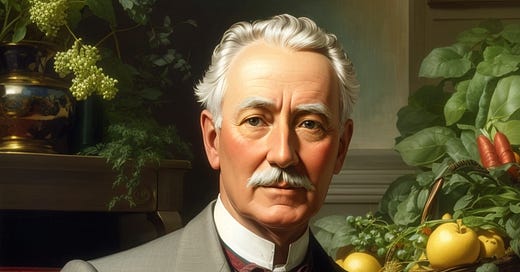Sir Albert Howard: The Father Of Organic Farming
The origins of organic farming and Sir Albert Howard
Thus far, we have discussed several influential pioneers who developed the principles and practices of organic agriculture. However, Sir Albert Howard, an English botanist who worked extensively in India, is often called the father of organic farming. He published "An Agricultural Testament" in 1940, outlining the principles of organic agriculture and emphasizing the importance of soil health, composting, and natural pest control methods.
Other notable pioneers in the development of organic farming include Lady Eve Balfour, who published "The Living Soil" in 1943, and J.I. Rodale, who founded the Rodale Institute and played a crucial role in promoting organic farming in the United States. Additionally, Rudolf Steiner's biodynamic agriculture, which started in the 1920s, can be seen as a precursor to modern organic farming methods.
These founders emphasized sustainability, ecological balance, and preserving natural resources, values that remain central to organic farming today.
Early Life and Education:
Born in Shropshire, England, Albert Howard was educated at the University of Cambridge, where he studied agriculture and botany. He was deeply passionate about understanding and applying natural processes to agricultural practices.
Work in India:
Howard spent a significant part of his career, from 1905 to 1931, in India, serving as the Imperial Economic Botanist to the Government of India and later as the Director of the Institute of Plant Industry. He extensively researched traditional Indian agricultural practices, focusing on soil health, natural pest control, and composting.
Guidelines for Organic Crop Production:
Albert Howard developed the fundamental concepts of organic farming through his observations and experiments conducted in India. He highlighted the importance of keeping the soil fertile through organic matter, crop rotations, and composting, collectively called the "Indore Process." He advocated for a holistic approach that saw the farm as an interdependent ecosystem and argued against synthetic chemicals and pesticides.
Publications:
The work "An Agricultural Testament" (1940), in which Sir Albert Howard articulated his concepts of organic farming and influenced a generation of farmers, scientists, and environmentalists, is the primary reason for Sir Albert Howard's notoriety as an author. His work brought attention to the symbiotic relationships between the soil, plants, and animals and the necessity of using environmentally responsible agricultural practices to preserve the ecological balance.
Legacy:
The work of Sir Howard has had a significant and long-lasting impact on agriculture. His ideas continue to shape organic agricultural practices all throughout the world, helping to promote environmentally sound agriculture and harmony in the natural world. It is a credit to Howard's vision and passion for harmonizing agricultural practices with nature that the organic movement, which places emphasis on the health of the soil, biodiversity, and the avoidance of synthetic chemicals, has emerged.
Howard is regarded as the "father" of organic farming since he established many fundamental principles to define organic farming. His concepts, which he developed primarily while living in India between 1905 and 1931, are founded on conventional farming methods and emphasize maintaining healthy soil, using compost, and avoiding chemical pesticides. He systematically organized these ideas and showed how they may be utilized in various contexts to enhance agricultural systems' long-term viability and output.
Development of Organic Farming Ideas:
Howard developed the idea of organic farming as a reaction against the increasing use of synthetic fertilizers and pesticides in agriculture. He believed that healthy, balanced soil was the key to productive farming and that synthetic chemicals disrupted this balance. He observed traditional agricultural practices in India and realized the importance of organic matter, crop rotations, and natural pest control in maintaining soil health and fertility.
Experiments:
Howard conducted extensive experiments to validate and refine the principles of organic farming. One notable experiment was the development of the "Indore Process" of composting, which involved a systematic approach to creating high-quality compost using a mix of animal manure, plant residues, and waste. This method demonstrated how farms could sustainably recycle nutrients and maintain soil health.
The lndore Process is not greatly different from modern composting processes. Plant wastes, animal manure, limestone or wood ashes to neutralize acids produced during decay, water, and air were the necessary ingredients (Fig. 2). Plant stalks often were laid in the roadway so cart traffic would crush them into small pieces, which would compost more readily. Urine earth (soil that had absorbed livestock urine) was crushed in mortar mills. The preferred method was to make compost in pits 30 × 14 × 2 ft deep, but in the rainy season pits could not be used. The piles were turned and moistened periodically; these are still typical practices. (Hershey, 1992)
Publications:
Sir Albert Howard’s findings and ideas are well documented in his seminal book "An Agricultural Testament," published in 1940. In this work, he meticulously outlined the principles of organic farming, argued against the reliance on synthetic chemicals, and promoted the importance of ecological balance in agriculture. This book is considered one of the foundational texts of the organic farming movement and has influenced generations of farmers, scientists, and environmentalists.
Why He Developed Organic Farming Principles:
Howard developed the principles of organic farming out of a concern for the long-term sustainability of agriculture. He witnessed the detrimental effects of soil degradation and loss of biodiversity due to industrial agricultural practices. He believed returning to more natural, holistic farming methods was essential for the environment's well-being and humanity.
I hope you enjoy these historical journeys and see how they are relevant today. Join the chat and add why you believe organic farming is important.
Sources:
Addison, Keith. Albert Howard. Date?https://journeytoforever.org/farm_library/howard.html
Hershey, DR. "Sir Albert Howard and the Indore Process" Hort Technology. Apr/June, 1992. https://journals.ashs.org › horttech › article-p267
RUSSELL, E. J. (1947). Sir Albert Howard, C.I.E. Nature, 160(4074), 741-742. https://doi.org/10.1038/160741a0. https://www.nature.com/articles/160741a0




